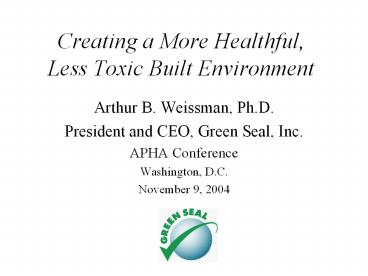Creating a More Healthful, Less Toxic Built Environment - PowerPoint PPT Presentation
Title:
Creating a More Healthful, Less Toxic Built Environment
Description:
Creating a More Healthful, Less Toxic Built Environment Arthur B. Weissman, Ph.D. President and CEO, Green Seal, Inc. APHA Conference Washington, D.C. – PowerPoint PPT presentation
Number of Views:110
Avg rating:3.0/5.0
Title: Creating a More Healthful, Less Toxic Built Environment
1
Creating a More Healthful, Less Toxic Built
Environment
- Arthur B. Weissman, Ph.D.
- President and CEO, Green Seal, Inc.
- APHA Conference
- Washington, D.C.
- November 9, 2004
2
Overview of Presentation
- Common products as source of toxins
- alternative, non-toxic products
- Data linking toxins to health and welfare
- Environmental standards promote alternatives
- product life-cycle as basis
- Benefit of standards
- linkages to occupants and community
3
Common Products As Source of Toxins
- HVAC systems, carpets, window furnishings,
wallboard, furniture, partitions, paints,
cleaners, fax and copier machines, etc. - Particleboard urea formaldehyde
- Paint petroleum distillates, VOCs
- Cleaners reproductive toxins, VOCs
4
Alternative, Non-Toxic Products
- Most building products have non-toxic
alternatives - no carcinogens, reproductive toxins, etc.
- not toxic to aquatic life
- not air pollutants or greenhouse gases
- Examples
- particleboard without formaldehyde resins
- paints with low or no VOCs
- Performance is equal
5
Data Linking Toxins To Health and Welfare
- Chronic exposure at small levels can harm
- LBNL study links indoor environment to health and
productivity - former influences symptoms, disease, productivity
- savings up to 58 billion in sickness avoided
- 20-200 billion in improved productivity
- improving indoor environments exceeds costs by
factors of 9 and 14 - Similar studies with schools sickness/scores
and green OM
6
Goals, Results, and Means
- Goals Remove toxins from built environment
- use precautionary, prevention approach
- Results Healthier More Productive
- greatest value of building in salaries
- Means How define non-toxic, green?
- environmental standards
7
Environmental Standards
- Must be developed in open, transparent process
- all interested stakeholders
- proposal, comment, revision consensus?
- Based on sound technical information
- life-cycle environmental impacts
- environmental attributes in current market
8
How Green Seal SetsEnvironmental Standards
- Appoint Stakeholder Committee (incl. Users,
Manufacturers, Trade Groups, Government,
Environmentalists, Others) - Study category
- Environmental Evaluation
- Draft standard
- Public review
- Response-to-Comments
- Stakeholder ballots
- Publish standard
9
Stakeholder Committee for GS-37
- Government
- City of Santa Monica
- MN Ofc Of Env Assist.
- MA Exec Ofc of Env Affairs
- US EPA
- US GSA
- Environmental
- INFORM
- Global Toxics Campaign, WWF
- Washington Toxics Coalition
- Environmental Health Coalition
- Others
- UMass Toxics Use Reduction Institute
- Individual experts
- Manufacturers
- Seventh Generation
- Spartan Chemical
- Clean Environment Co.
- Church Dwight
- 3M
- Users
- US Postal Service
- Aberdeen Proving Ground
- Intl Exec Housekeepers Assn
- American Federation of State, County, Munic.
Employees - ServiceMaster Industries
10
Life-Cycle Approach
- Life Cycle
- material, energy, resource flows, in and out
- extraction, manufacture, use, end-of-life
- inventory, impacts, assessment
- Ensures
- no significant impacts/attributes neglected
- environmental impacts not simply shifted
11
What Environmental Standards Represent
- Combine life-cycle information and market
- key environmental attributes in life-cycle
- profile of products in market
- Standards reflect leadership level
- re environmental performance
- top 15-20 of products in market
- Guide purchasers, encourage producers
12
Benefit of Standards for Built Environment
- Cover products, procedures for
- construction
- operation and maintenance
- Least environmental, health impact
- Enhance productivity, health of workers, community
13
Some Key Green Seal Environmental Standards
- Lodging Properties (GS-33)
- Institutional and Industrial Cleaners (GS-37)
- Architectural Paints (GS-11)
- Electric Chillers (GS-31)
- Criteria for Green Facilities OM (GS-39)
- Tissue and Paper Towels (GS-1 9)
- Photovoltaic Modules (GS-32)
- Floor-Care Products (issue ca. Nov.)
14
Linkages to Occupants, Community
- Green buildings can
- boost productivity 6 to 26
- reduce absenteeism (sickness) by 15
- be a model for homes and communities
- Green buildings are achievable and affordable
- any incremental cost readily paid back
- life-cycle cost less in longer run
15
Conclusion
- Common products in buildings
- can have serious toxic ingredients
- can cause health and productivity impacts
- Healthier substitutes can be found
- Environmental standards are the guide
- Green buildings promote health, productivity, and
general welfare































